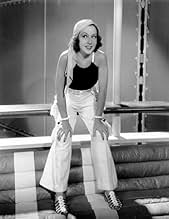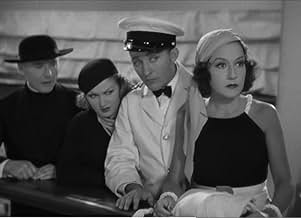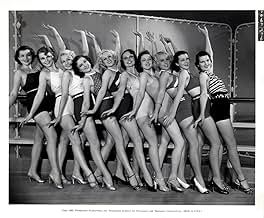Ajouter une intrigue dans votre langueYoung man falls for blonde heiress forced onto ship. Follows to rescue her, disguising as mobster's aide when realizing she's returning home and his boss is aboard.Young man falls for blonde heiress forced onto ship. Follows to rescue her, disguising as mobster's aide when realizing she's returning home and his boss is aboard.Young man falls for blonde heiress forced onto ship. Follows to rescue her, disguising as mobster's aide when realizing she's returning home and his boss is aboard.
- Réalisation
- Scénario
- Casting principal
- Récompenses
- 3 victoires au total
- Federal Man
- (non crédité)
- Ling
- (non crédité)
Avis à la une
Ethel Merman recreating her Broadway Reno Sweeney is at her best (possibly outshining even her later, smoother Broadway recreation in the film of CALL ME MADAM) and amply demonstrates why she (along with Mary Martin) was at the top of most lists of 20th Century musical theatre stars.
More than ample support is provided by Bing Crosby in the William Gaxton role of Billy Crocker (who Reno is attracted to but who hankers after runaway socialite Hope), Charlie Ruggles in the Victor Moore role of "Public Enemy #13, 'Moonface' Martin - on the lamb from the FBI, Ida Lupino as Hope Harcourt, Arthur Treacher as Lord Evelyn Oakleigh who is trying to bring Hope home to England to marry her, Margaret Dumont briefly seen as Mrs. Wentworth the owner of a kidnapped Peikinese, Charlie Chan's "Number One Son" Keye Luke & Philip Ahn as a pair of gambling Chinese and Grace Bradley as Moonface's moll Bonnie.
All are blissfully gathered (and some farcically hiding) on a ship crossing from New York to London. The original pre-Broadway rehearsal script had the cast shipwrecked, but the well publicized burning of the actual cruise ship Morro Castle off New Jersey while the show was in preparation made shipwrecks decidedly unPC for musical comedy so all the action was kept on board.
Few shipboard films (certainly not the bland and UNfaithful 1956 remake with Crosby and Mitzi Gaynor) have as much fun capturing an Atlantic crossing OR a Broadway show.
However, that doesn't mean you should ignore this revamped film version, which has historical interest because it preserves one of the few film performances of Ethel Merman. The Broadway show, which opened in 1934 and ran for 420 performances (quite a long run in those days), actually gets better treatment than other Porter musicals adapted for film. I have in mind "DuBarry was a Lady," the 1943 vehicle that stars Lucille Ball, Gene Kelly and Red Skelton, and "Something for the Boys" (1944).
"Anthing Goes," which was renamed "Tops Is the Limit" to prevent confusion with the 1956 remake, again starring Bing Crosby, is more of a vehicle for Crosby than anyone else, which is why outside songwriters were brought in to provide him with material more suited to his vocal skills.
Only three of Porter's songs are given anything resembling a full treatment (albeit with laundered lyrics): "You're the Top," "I Get a Kick Out of You" and "There'll Alway Be a Lady Fair." Other songs are used as background or underscoring (e.g., "All Through the Night," "Blow, Gabriel, Blow.").
In the original cast, Merman was joined by two big Broadway stars -- William Gaxton and Victor Moore -- as well as a lady named Vivian Vance, while the film gives us, besides Crosby and Merman, Charles Ruggles, Ida Lupino and the veddy, veddy English Arthur Treacher.
The plot, such as it is, hardly matters. In her autobiography "Who Could Ask for Anything More," Ethel Merman tells why:
" ...the writers who used to think up the books that were wrapped around Gershwin or Cole Porter scores, started from scratch, which only their bare cupboards and an unmanageable sense of humor to guide them. First a producer signed a cast; then he hired writers to rustle up some material for that cast to use. 'I've got Bert Lahr,' he'd say. Or 'I've got Victor Moore. Get going' buddy. Make with the Moore-type yoks.' " In the mid-1950s, Merman and Frank Sinatra performed in "Anything Goes" on television. The program was later released on a bootleg album. If enjoy the film, with a little research you'll even find it on DVD.
Enjoy the hijinks, singing and production numbers.
She soon appears on a swing singing a very cleaned up version of "I Get a Kick Out of You" then confusion sets in. This is not Bing Crosby's finest moment. Charlie Ruggles is a riot as Moon Face Martin, Public Enemy No. 13 (although having seen Victor Moore in a couple of films I can imagine how funny he would have been). Crosby is mistaken for Snake Eyes Johnson, a fellow gangster - he has followed Hope Harcourt (luminous Ida Lupino) on to a liner, thinking she is being harassed by gangsters, but in reality her father has hired private investigators. There is a scene were Reno Sweeney (Merman) and Arthur Treacher start a conversation with "you do something to me" (from Porter's "50 Million Frenchmen" (1929)) - perhaps it was to convince the audience that this movie was based on a Cole Porter musical and they were in the right movie house!!! Mostly the film is filled with lack lustre, forgettable songs although "You're the Top" is sang with verve by Crosby and Merman. The finale "Shanghi De Ho" is a lavish number that looks as though it is filmed in a theatre and not on the docks as it is supposed to be. The film, to me, seemed to have a cheap look about it!!!
They throw out all but four of the original songs and turn the film into a Bing Crosby vehicle by getting a group of songwriters to write several new songs especially for him, one of them reportedly at his request. Then, they rewrite the lyrics to "You're the Top" (one of Porter's most clever songs), retain only the first verse of the title song, "Anything Goes", make a minor change (required by the censors of the time) to the lyrics to "I Get A Kick Out Of You", keep the original plot line (notice that the filmmakers considered the ridiculous plot sacred enough to leave alone, but not Cole Porter's songs), and release this flat, unfunny mess. At least Ethel Merman fans get to see her sing two of her biggest hit songs on film.
Le saviez-vous
- AnecdotesW.C. Fields was replaced before filming began with Charles Ruggles.
- GaffesDuring "Sailor Beware," there is a shot of deckhands strumming guitars at a much faster tempo than the song itself, suggesting that it's stock footage from another film.
- Citations
[first lines]
Reno Sweeney: [singing] In olden days a glimpse of stocking / Was looked on as something shocking, / Now, Heaven knows, / Anything goes!
[as she sings the words "anything goes", the title of the film appears onscreen]
- ConnexionsFeatured in Paramount Presents (1974)
Meilleurs choix
- How long is Anything Goes?Alimenté par Alexa
Détails
- Date de sortie
- Pays d’origine
- Langue
- Aussi connu sous le nom de
- Tops Is the Limit
- Lieux de tournage
- Société de production
- Voir plus de crédits d'entreprise sur IMDbPro
Box-office
- Budget
- 1 100 000 $US (estimé)
- Durée
- 1h 32min(92 min)
- Couleur
- Rapport de forme
- 1.37 : 1


































